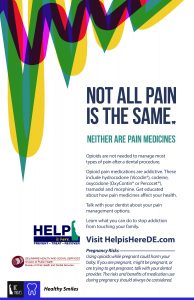DOVER — The Delaware Division of Public Health (DPH) is engaging dental providers in the launch of a statewide campaign directed at increasing awareness about the addictive nature of opioid medications used after dental procedures. Dentists are among the leading prescribers of opioid medications, particularly for surgical tooth extractions. In fact, dentists and oral surgeons are commonly in a position to prescribe adolescents their first opioid prescription after the removal of the third molars, also known as “wisdom teeth.” The highest number of dental-related opioid prescriptions are for teenagers ages 14 to 17, followed closely by young adults ages 18 to 24.
DPH has begun distributing a toolkit to every dental office in the state with resources for both dentists and patients to encourage safe and healthy pain management. Included is a provider letter and fact sheet, a patient brochure, and posters for display in dental offices. The campaign drives home the message that “all pain is not the same,” and therefore should be treated effectively without opioids whenever possible. The American Dental Association (ADA) strongly recommends considering non-steroidal anti-inflammatory drugs (NSAIDs) such as Motrin or Aleve as the first-line of therapy for acute pain management.
“Dental professionals have a unique opportunity to help curtail the opioid epidemic by suggesting opioid alternatives for pain management when possible, counseling patients on the risks of opioid use, and educating on proper disposal procedures,” said Dr. Nick Conte, Director of the DPH Bureau of Oral Health and Dental Services (BOHDS).
A 2011 study in the Journal of the American Dental Association (JADA) estimated that dentists are responsible for 12 percent of prescriptions for fast-acting opioid pain relievers, just below general practitioners and internal medicine doctors. The opioid drugs most commonly prescribed by dentists are hydrocodone and oxycodone, which are highly addictive and have the highest potential for abuse.
This statewide campaign supports a larger state initiative to lower the rate of opioid prescriptions, with the ultimate goal to reduce opioid-related overdoses and deaths. In 2018, DPH launched an expanded section on HelpIsHereDE.com for health care providers, loaded with information; tools, such as forms and screening templates; and resources, including patient materials. Patient and dental provider materials from the oral health toolkit have now been added to the health care provider section of the website. HelpIsHereDE.com is a website providing addiction prevention, treatment, and recovery resources and information for individuals, families and health care providers in Delaware.
According to the CDC, Delaware is ranked first in the nation for prescribing high-dose opioids, and is also ranked first for prescribing long-acting opioids. DPH Director Dr. Karyl Rattay says that while a small percentage of providers (1 percent) are writing 32 percent of opioid prescriptions, almost all providers are struggling with how to better help their patients.
“This isn’t just about telling providers what they need to do,” said Dr. Rattay of the expansion of the health care provider section of the website. “It’s about motivating them by telling them why they need to do it. It’s also about providing comprehensive, evolving support to the trusted caregivers in our community. Certainly, the entire crisis surrounding opioid addiction and drug-related deaths doesn’t lie solely in the hands of health care providers, but they are the critical starting point, and offer the greatest potential for impacting our state’s continual move toward safer use of opioids.”
Preliminary estimates for 2018 indicate 419 overdose deaths across the state, an increase of 21 percent from the 2017 total of 345 deaths, according to the Division of Forensic Science. The CDC ranked Delaware number six in the nation for overdose mortality rate in 2017.
If you or a loved one is struggling with addiction in Delaware, call DHSS’ 24/7 Crisis Hotline to be connected to treatment and recovery options. In New Castle County, call 1-800-652-2929. Or in Kent and Sussex counties, call 1-800-345-6785. To search online for treatment and recovery services in Delaware or nearby states, visit www.HelpIsHereDE.com.
A person who is deaf, hard-of-hearing, deaf-blind or speech-disabled can call the DPH phone number above by using TTY services. Dial 7-1-1 or 800-232-5460 to type your conversation to a relay operator, who reads your conversation to a hearing person at DPH. The relay operator types the hearing person’s spoken words back to the TTY user. To learn more about TTY availability in Delaware, visit http://delawarerelay.com.
The Department of Health and Social Services is committed to improving the quality of the lives of Delaware’s citizens by promoting health and well-being, fostering self-sufficiency, and protecting vulnerable populations. DPH, a division of DHSS, urges Delawareans to make healthier choices with the 5-2-1 Almost None campaign: eat 5 or more fruits and vegetables each day, have no more than 2 hours of recreational screen time each day (includes TV, computer, gaming), get 1 or more hours of physical activity each day, and drink almost no sugary beverages.